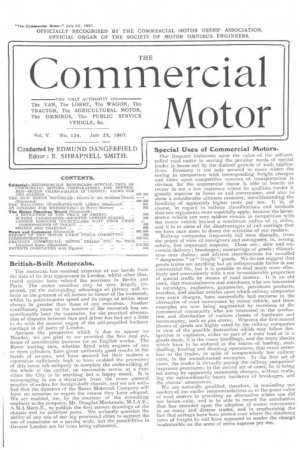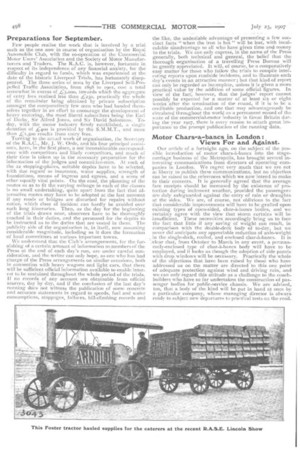British-Built Akotorcabs.
Page 1

Page 2

If you've noticed an error in this article please click here to report it so we can fix it.
The tnotorcab has received attention at our hands from the date of its first appearance in London, whilst other illustrated articles have related the positions in Berlin and Paris. The motor omnibus may be very largely improved, yet the outstanding advantage of privacy will remain as the greatest of all factors in favour of the rnotorcab, whilst its point-to-point speed and its range of action must always be greater than those of any motorbus. Another contributory cause to the success of the motorcab has unquestionably been the taximeter, for the practical elimination of disputes between fare and driver has had not a little to do with the present vogue of the self-propelled hackney carriage in all parts of London. Apropos the prospectus which is due to appear on Monday, we are glad to see provided the first real evidence of considerable business for an English works. The Rover touring cars, whether fitted with engines of one or more cylinders, have given uniformly good results in the hands of owners, and have secured for their makers a reputation sufficiently high to have enabled the promoters of this latest cab company to complete the underwriting of the whole of the capital, on reasonable terms, at a time when the City is in anything but a happy mood.. It is encouraging to see a departure from the more general practice of orders for foreign-built chassis, and we are satisfied that the directors of the Rover Motorcab Company will have no occasion to regret the course they have adopted. We are enabled, too, by the courtesy of the consulting engineer to the company, Mr. Douglas Mackenzie, M.I.A.E., A.IVI.I.Mech.E., to publish the first correct drawings of the chassis and its principal parts. We seriously question the ability of any one of our big provincial cities to support the use of motorcabs on a paying scale, but the possibilities in Greater London are far from being exhausted.
Special Uses of Commercial Motors.
Our frequent insistence upon the value of the self-propelled road motor in serving the peculiar needs of special trades is borne out by the distinct growth of such applications. Economy is not only secured in cases where the saving in comparison with corresponding freight charges and rates upon competitive systems of transportation is obvious, for the commercial motor is able to benefit its owner in not a few instances where its qualities render it greatly superior to horse or rail conveyance, and also to show a considerable ultimate economy, notwithstanding the handicap of apparently higher costs per ton. It is, of course, in regard to railway classifications and methods that our arguments more especially apply, because the horsedrawn vehicle can very seldom remain in competition with the motor vehicle beyond a maximum radius of 15 miles, and it is to some of the disadvantages of rail carriage that we have once more to direct the attention of our readers.
Railway companies frequently fail most dismally, from the points of view of consignors and consignees, in, among others, five important respects. These are : slow and uncertain delivery ; breakages; miscarriage of goods; dilatoriness over claims; and adverse classifications for so-called "dangerous " or" fragile "goods. We do not suggest that goods trains are anything but an indispensable factor in our commercial life, but it is possible to deal much more effectively and conveniently with a not inconsiderable proportion of special traffic by means of road motors. It is an old story, that manufacturers and merchants who are interested in cartridges, explosives, gunpowder, petroleum products, matches, and similar articles upon which railway companies levy extra charges, have successfully had recourse to the alternative of road conveyance by motor vehicle, and these examples are now being augmented by members of the commercial community who are interested in the production and distribution of various classes of hardware and ironmongery, such as gas stoves. Whereas the first-named classes of goods are highly rated by the railway companies in view of the possible destruction which may follow fire, ignition or explosion, either as part of a train load or in a goods depot, it is the many handlings, and the many shocks which have to be endured in the course of loading, marshalling, hauling and shunting operations, that cause severe loss to the trader, in spite of comparatively low railway rates, in the second-natned examples. In the first set of cases, the trader is virtually paying the railway companies' insurance premiums; in the second set of cases, he is being led astray by apparently reasonable charges, without realising the extraordinarily heavy incidence of breakages, and the claims' annoyances. We are naturally gratified, therefore, in reminding our readers of our earlier recommendations as to the great value of road motors in providing an alternative where one did not before exist, and to be able to record the satisfaction that has attended upon the adoption of motor conveyance in so many and diverse trades, and in emphasising the fact that savings have been proved even where the obtaining rates of freight by rail have appeared to render the change inadmissible on the score of extra expense per ton.
Preparations for September.
Few people realise the work that is involved by a trial such as the one now in course of organisation by the Royal Automobile Club, with the co-operation of the Commercial Motor Users' Association and the Society of Motor Manufacturers and Traders. The R.A.C. is, however, fortunate in respect of its independence of any financial anxiety, for the difficulty in regard to funds, which was experienced at the date of the historic Liverpool Trials, has fortunately disappeared. The three series of tests by the Liverpool Self-Propelled Traffic Association, from 1898 to i9or, cost a total somewhat in excess of L3,000, towards which the aggregate of .entry fees realised less than L:250, practically the whole of the remainder being obtained by private subscription amongst the comparatively few men who had handed themselves together in an effort to encourage the development of heavy motoring, the most liberal subscribers being the Earl of Derby, Sir Alfred Jones, and Sir David Salckmons. Today, with the motor industry firmly established, a single donation of .4_7400 is provided by the S.M.M.T., and more than £m,soo results from entry fees.
Turning to the actual work of organisation, the Secretary of the R.A.C., Mr. J. W. Ordc, and his four principal assistants, have, in the first place, a not inconsiderable correspondence with competitors and likely competitors, and much of their time is taken up in the necessary preparation for the information of the judges and oommittee-men. At each of the 22 stopping-places, suitable depots have to be selected, with due regard to insurance, water supplies, strength of foundations, means of ingress and egress, and a score of other equally vital points. On the road, the planning of the loutes so as to fit the varying mileage in each of the classes is no small. undertaking, quite apart from the fact that alternative routes may have to be adopted at the last moment if any roads or bridges are disturbed for repairs without notice, which class of incident can hardly be avoided over such long itineraries. Then, as the day for the beginning of the trials draws near, observers have to be thoroughly coached in their duties, and the personnel for the depOts to be instructed as to the duties that are vested in them. The publicity side of the organisation is, in itself, now assuming considerable magnitude, including as it does the formation of local comn3ittees at various important towns,
We understand that the Club's arrangements, for the furnishing of a certain amount of information to members of the Press at the end of each day's run, arc under careful consideration, and the writer can only hope, as one who has had charge of the Press arrangements on similar occasions, both in connection with heavy wagons and light cars, that there will be sufficient official information available to enable interest to be sustained throughout the whole period of the trials. If no records of any account are obtainable from official sources, day by day, and if the conclusion of the last day's running does not witness the publication of some concrete and accurate statements in regard to speeds, fuel and water consumptions, stoppages, failures, hill-climbing records and the like, the undeniable advantage of presenting a few succinct facts " when the iron is hot " will be lost, with incalculable disadvantage to all who have given time and money to the trials. We can only express, in the name of the Press generally, both technical and general, the belief that the thorough organisation of a travelling Press Bureau will be greatly appreciated. It will, of courk, be a comparatively easy matter for those who follow the trials to compile interesting reports upon roadside incidents, and to illustrate each day's events in an attractive manner; but that kind of report can only be regarded as incomplete, unless it is given a more practical value by the addition of some official figures. In view of the fact, however, that the judges' report cannot possibly be expected for a matter of at least six or eight weeks after the termination of the round, if it is to be a creditable production, and one that may advantageously be circulated throughout the world as a permanent record of the state of the commercial-motor industry in Great Britain during the year 1907, :there is every reason to attach great importance to the prompt publication of the running data.
Motor Chars-a-banes in London : Views For and Against.
Our article of a fortnight ago, on the subject of the possible introduction of motor chars-a-bancs into the stagecarriage business of the Metropolis, has brought several interesting communications from directors of operating companies in London. We regret very much that we are not at liberty to publish these communications, but no objection can be raised to the references which we now intend to make to their contents. It Is generally agreed that the average fare receipts should be increased by the existence of protection during inclement weather, provided the passeng-crs' arc duly safeguarded against the entry of rain or draughts at the sides. We are, of course, not oblivious to the fact that considerable improvements will have to be grafted upon .existing types of open-sided, char-a-bancs bodies, and we certainly agree with the view that storm curtains will be insufficient, These necessities accordingly bring us to face the fact that little if any saving of weight can result, in comparison -with the double-deck body of to-day, but we never did anticipate any appreciable reduction of axle-weight in the single-deck, roofed, and enclosed char-a-bancs. It is .clear that, from October to March in any event, a permanently-enclosed type of char-a-bancs body will have to be employed, and it looks as though the adoption of side panels with drop windows will be necessary. Practically the whole of the objections that have been raised by those who have addressed us on the matter are directed to this one point of adequate protection against wind and driving rain, and we can only regard this attitude as a challenge to the coachbuilders who have so far undertaken the construction of passenger bodies for public-service chassis. We are advised, too, that a body of the kind will be put in hand at once by a particular company, whose managing director is always ready to subject new departures to practical tests on the road.
























